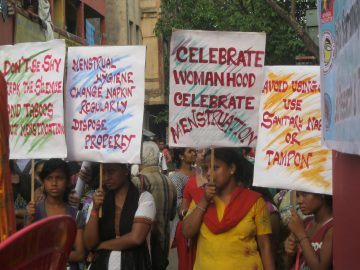Farah Ahamed in Ploughshares:
 “A period is something I deal with, without thinking about it particularly, or rather I think of it with a part of my mind that deals with routine problems. It is the same part of my mind that deals with the problem of routine cleanliness.” In Doris Lessing’s 1962 novel, The Golden Notebook, the protagonist, Anna, worries about her period and how it will affect the integrity of her writing. In the early 1960s, it was unusual and brave for a work of fiction to mention menstruation, let alone explore it in such detail. Broadly speaking, in mainstream fiction, examples of menstruation are few and far between.
“A period is something I deal with, without thinking about it particularly, or rather I think of it with a part of my mind that deals with routine problems. It is the same part of my mind that deals with the problem of routine cleanliness.” In Doris Lessing’s 1962 novel, The Golden Notebook, the protagonist, Anna, worries about her period and how it will affect the integrity of her writing. In the early 1960s, it was unusual and brave for a work of fiction to mention menstruation, let alone explore it in such detail. Broadly speaking, in mainstream fiction, examples of menstruation are few and far between.
Until recently, the topic of menstruation has been universally regarded as taboo, shrouded in secrecy and mythology. Historically, in some cultures, men refused to acknowledge it, in order to maintain a romantic image of women. In others, it is still linked with ritual impurity and lunar madness, while in certain hunter-gatherer and mountain communities, it is viewed as a sacred time for female solidarity, associated with healing and psychic powers. These ideas and practices are reflected in those few works that deal with the subject, which incorporate themes of learnt shame and the existence of women “elsewhere” due to some form of negative transformation.
More here.
